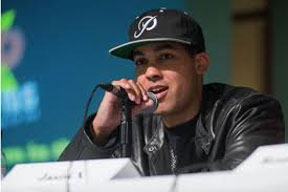
Can the Black community change the face of the music industry?
By Rebecca Nuttall
Special to the NNPA from the New Pittsburgh Courier
Jasiri X talks about grassroots activism in the Obama/Tea Party Era at Columbia College in Chicago. (Courtesy Photo Bakari Kitwana/Andrew Bryce Photography)
Members of the Black intelligentsia let out a collective victory cry last week when hip-hop artist Lil Wayne lost a multi-million dollar endorsement deal with Mountain Dew as a result of lyrics comparing the beating of murdered teenager Emmett Till in 1955 to female genitalia.
Led by outcry from Till’s family, one by one the nation’s Black bloggers and columnists were sounding off. Their justice was swift. Or not. While the song, which featured Wayne’s lyrics, was released in February, it took until May for Mountain Dew to take notice and drop him.
Still Mountain Dew’s action, coupled with Reebok’s latest decision to sever ties with hip-hop artist Rick Ross because of his own offensive lyrics, could be indicative of the growing power of public opinion when married with social media. Perhaps if enough people stand up, in the form of blogs and twitter posts, these kinds of heinous lyrics will no longer percolate the airwaves.
“Artists now are going to be more careful about what they say,” said nationally known hip-hop artist Jasiri X from Pittsburgh. “They were so used to saying the most outlandish and ridiculous stuff.”
This certainly wasn’t the first time Wayne recorded offensive lyrics, but it was perhaps the first time the lyrics gained national attention. Now Jasiri X hopes Americans will begin to turn to conscious rappers, who promote more positive images of African-Americans as an alternative.
“I think it shows the power we have as a community. I think it’s a power we’ve always had, we complain, but we don’t really organize,” he said. “My only concern or critique is what we need to do is offer an alternative.”
However, Jasiri X and other conscious rappers say White CEOs are actually the ones pulling the strings behind these mainstream hip-hop artists.
In an effort to hold them accountable, one group, the Internet collective FAAN Mail, which stands for Fostering Activism and Alternatives Now, sent a letter to Universal Music Group.
The letter was in response to a music video by rapper 2 Chainz that carries on the rap tradition of objectifying women.
“It’s really about representations of Black people that these older white CEOs are comfortable with,” said Jasiri X, who runs the One Hood Media Academy where young Black males learn how to use the media to promote positive images of their peers. “At the end of the day, Lil Wayne and Rick Ross are really intelligent. Neither of them are really street guys, they’re playing a character for these White CEOs to make money so that’s really who we have to challenge.”
Jasiri X pointed to other conscious artists like Lupe Fiasco as examples of musicians making a positive impact on the Black community by promoting positive images. During a recent visit to Pittsburgh, Fiasco performed at Carnegie Mellon University and put students in Jasiri X’s One Hood Media Academy on the guest list so they could attend.
“If we have artists like that, that’s who I want to see Mountain Dew work with,” he said.
Some believe the Black community has the power to change the face of the music industry, but if Wayne is so abhorrent, why did he surpass Elvis Pressley last year as the leading male with the most entries on Billboard’s Hot 100 chart? Does Black America really care if Wayne’s lyrics are insensitive? And what about White America, whose buying power accounts for a great deal of Wayne’s success? Tell us what you think.
Footer begins
